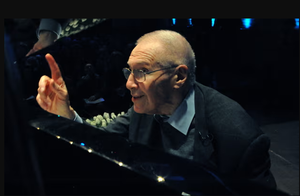As Concerto Budapest performs Ligeti’s Century – Roaming in the Past, Kurtág sits behind its music director, András Keller, shadow-conducting from the score which quivers in his hands, and making the sounds he thinks the instruments should be making. “Yo-reee, not yo-ri”, he says. “Pa-DAL!”, he shouts, his elbow pushing into the arm of his wheelchair. As his opera arrives at the Proms, the avant garde master gives a rare interview for The Guardian.

Photograph: Judit Marjai
‘I compose to seek the truth’
- György Kurtág on depression, totalitarianism and his 73-year marriage
He was mentored by Ligeti, too shy to meet Beckett, and half of one of the greatest ever musical and romantic partnerships. As his opera arrives at the Proms, the avant garde master gives a rare interview.
örgy Kurtág is not speaking metaphorically when he says he is quite content to spend the time he has left “living on Ligeti street”. He is with a small crowd gathered outside the Budapest Music Centre – in which he also resides – for the renaming ceremony of the road on which it stands. Formerly Imre Utca (street), it is now György Ligeti street, to mark the centenary of the Hungarian composer who was Kurtág’s longtime friend and mentor.
Kurtág, whose intense, intimate and often brief music could hardly be more different to Ligeti’s, spent years in the latter’s shadow; international recognition only came in the 80s. But even 17 years after Ligeti’s death, he can scarcely contemplate a conversation or a composition without referring to him. He rarely gives interviews, but has made an exception to mark his friend’s anniversary and the UK debut of his first opera.
He makes no secret of his insecurities, episodes of mental illness which sometimes paralysed – his word – his creativity for years at a time. Now 97, he wants to use his remaining years to concentrate on his music.
In the BMC he attends a rehearsal of the piece he has written to commemorate his friend. As Concerto Budapest performs Ligeti’s Century – Roaming in the Past, Kurtág sits behind its music director, András Keller, shadow-conducting from the score which quivers in his hands, and making the sounds he thinks the instruments should be making. “Yo-reee, not yo-ri”, he says. “Pa-DAL!”, he shouts, his elbow pushing into the arm of his wheelchair.
“The sound should be shredded, not whole,” he instructs the orchestra, or, he urges the cellists, who are playing pizzicato, to “enjoy the resonation more”; at another moment, “here you should convey a kind of doubt, and not be so confident”. A clarinet is admonished for allowing a horn to muffle its sound. There is much banter and laughter. It is pure entertainment to behold.
Kurtág is the last survivor of an outstanding generation of postwar avant garde composers that includes Boulez, Stockhausen and Nono, but he emphasises how important Hungarian composers Bartók and Kodály also were to both him and Ligeti. While Kurtág largely stayed in Communist Hungary, Ligeti escaped and settled in western Europe, though the two managed to remain closely connected.
Sitting in a wood-panelled rehearsal room at the BMC, Kurtág, speaking in German, clad in his house slippers and a tailored jacket, recalls their first meeting as being “like a lightning strike”, during the entrance exam for music school in September 1945.
“I read his scores and I could see that this was no student, but a full-blown musician. From that moment on, I was his follower, I was his satellite and orbited around him, and that was how our lifelong relationship was,” he says. “Even after his death I feel the connection to him, to his undiminished curiosity.”
The entire article is available on theguardian.com
